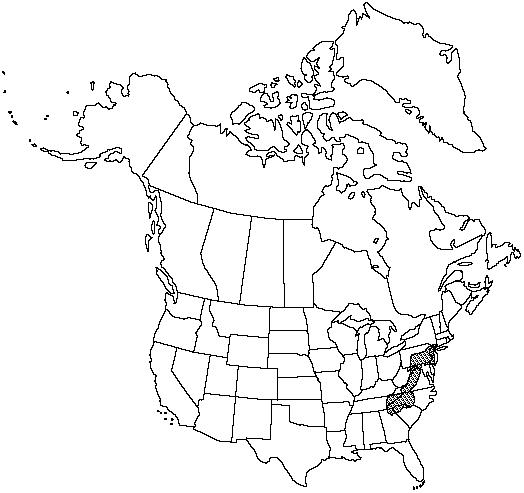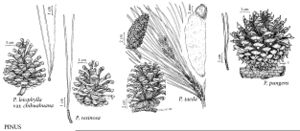Pinus pungens
Ann. Bot. (London) 2: 198. 1805.
Trees to 12m; trunk to 0.6m diam., straight to crooked, erect to leaning, poorly self-pruning; crown irregularly rounded or flattened. Bark red to gray-brown, irregularly checked into scaly plates. Branches horizontally spreading; twigs slender, orange to yellowbrown, aging darker brown, rough. Buds ovoid to cylindric, redbrown, 0.6–0.9cm, resinous. Leaves 2 (–3) per fascicle, spreading or ascending, persisting 3 years, 3–6 (–8) cm × 1–1.5mm, twisted, deep yellow-green, all surfaces with fine stomatal lines, margins harshly serrulate, apex acute to short-acuminate; sheath 0.5–1cm, base persistent. Pollen cones ellipsoid, ca. 15mm, yellow. Seed-cones maturing in 2 years, variably serotinous, mostly whorled, downcurved, asymmetric, ovoid before opening, broadly ovoid when open, (4–) 6–10cm, gray to pale redbrown, nearly sessile or on stalks to 1cm; apophyses thickened, diamond-shaped, strongly keeled, elongate, mammillate at cone base abaxially; umbo central, a stout, curved, sharp claw. Seeds deltoid-obovoid, oblique; body ca. 6mm, deep purple-brown to black; wing 10–20 (–30) mm. 2n =24.
Habitat: Dry, mostly sandy or shaly uplands, Appalachians and associated Piedmont
Elevation: 500–1350m
Distribution

Del., Ga., Md., N.J., N.C., Pa., S.C., Tenn., Va., W.Va.
Discussion
Pinus pungens is a scrub pine and is too small and knotty to be much utilized except for pulpwood and firewood. Its common name refers to a general type of landform, not to a specific, named mountain.
Selected References
None.
